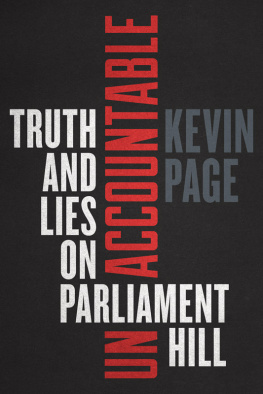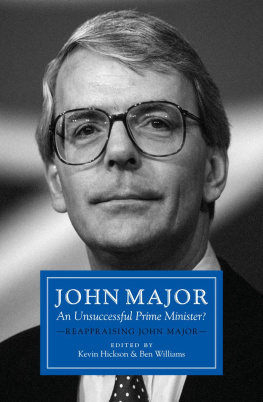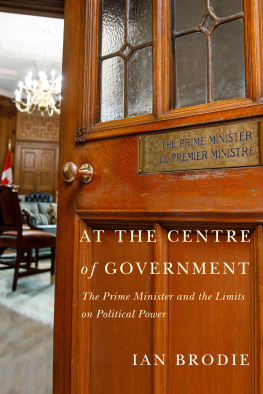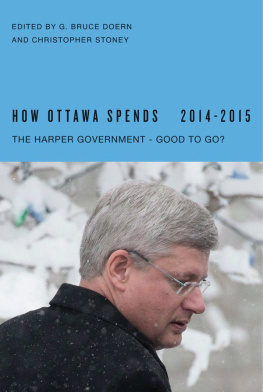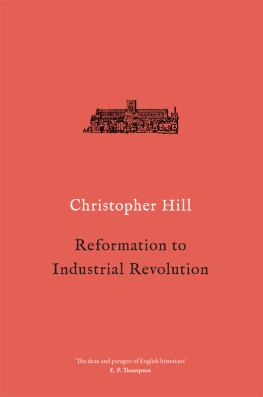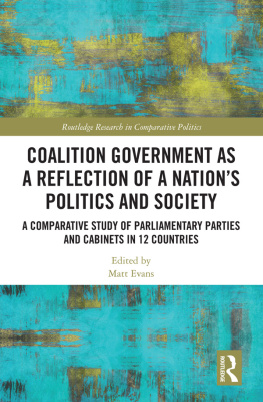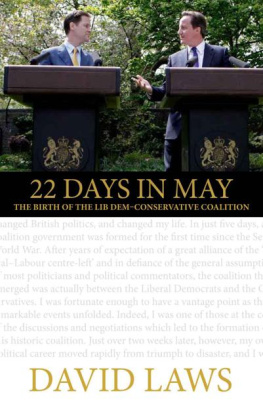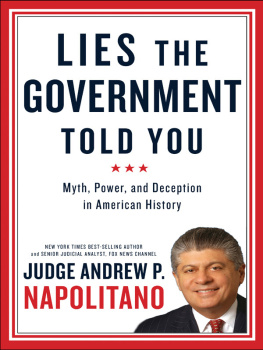UNACCOUNTABLE
TRUTH AND LIES
ON
PARLIAMENT HILL

I dedicate this book to my wife, Julia. Her love and personal courage during the most difficult times that any parent could ever have to endure were, and still remain, an inspiration to me. I love you.
I dedicate this book to my children, Jesse and Chelsey, two wonderful people who make their parents so very proud.
I dedicate this book to every member of my family, as well as to my extended family of friends. In these relationships I continue to find great strength and purpose.
And lastly, and very specifically, I dedicate this book to my late son,Tyler. I owe him for giving me the courage to try. In the struggle, I found new meaning.
PROLOGUE
I t was early on the afternoon of May 3, 2012, when I walked into a meeting room on Parliament Hill to confer with members of the Standing Committee on Public Accounts. My attendance at that meeting had been requested given my role at the time as Canadas first ever parliamentary budget officer (PBO). The PBO was a position that had been conceived, created, and embedded in the law of the land by the Conservative Party of Canada, the governing party in Ottawa. It was intended to be an independent office with the primary duty of scrutinizing proposed government spending to protect the interests of all Canadians. I had been appointed to the position by Prime Minister Stephen Harper himself, and my five-year term was fast coming to an end. A career public servant, I had accepted the position knowing full well that it would probably be my last stop within the ranks of the civil service.
This particular meeting was hardly business as usual. The main topic for discussion was the governments proposed purchase of the F-35 fighter plane, a procurement that would be the largest military purchase of capital equipment in recent memory. But this meeting was not only about buying planes. More importantly, this was about trust, accountability, and fiscal management on the part of our federal government. Why? Because Auditor General Michael Ferguson had called the government to task on the purchase. He had rattled its chains with his own findings about the F-35s, effectively demonstrating that civil servants had gone to cabinet with projected numbers that were even larger than those we had forecasted at the PBO a year earlier. Yet all the while, the public reports emanating from the government estimated smaller numbers. At the same time, politicians were criticizing the PBO analysis as incorrect. Something didnt add up. Once the auditor generals report went public, the need for this meeting had become apparent. It represented an opportunity to put the F-35 procurement back on the rails.
When Terry Milewski, a senior correspondent from the CBC, walks in to such a meeting, you know that theres going to be national coverage, and there he was. By the time I entered the building, there were already other members of the press gathering in the hallway outside the meeting room. This was going to be an interesting mix of politicians, civil servants, and media. As I made my way into the room, I observed many of the heavy hitters in town in attendance, all lined up according to party affiliation with loyalties clearly stitched onto their sleeves. The government had decided to purchase the F-35s and the forecasts of those costs were in dispute. Members of the Conservative government involved in this purchase had appeared very self-assured in the days leading up to the announcement of their plans. The F-35s carried a hefty price tagand those costs would be borne by the taxpayers of Canada. But I had my doubts about the governments projections. My team at the Parliamentary Budget Office believed that due diligence was lacking, and I was prepared to state that for the record. The government had estimated that the total bill for such a piece of military hardware would be somewhere between $9 billion and $16 billion, dependent upon the costing framework and the anticipated useful life cycle of such a plane. Our research showed that their budgeted numbers were far below the actual likely full costs for such a purchase. And so, what might have been just another day in Ottawa, just another meeting with bureaucrats, just another day on the job as the parliamentary budget officer, became much more.
This had turned into a highly charged event. The chair of the committee, David Christopherson, went out of his way to lay ground rules so as to create a forum for meaningful discussion. At the beginning of the meeting, I took a quick visual scan of the room as our presentation was being distributed. The Conservative backbenchers did not appear to be a happy bunch. I knew we had the right numbers, and I could see that reality reflected back at me through their expressions. I looked over to my left and noticed that Bob Rae was in the room. I remember thinking how unusual that was because he wasnt a member of this committee, and his presence signalled to me that the stakes were high. Rae was in attendance to observe and gather information in preparation for his next discussions of the F-35s with people from the Department of National Defence (DND).
I wasnt sure how Conservative members were going to behave, given the auditor generals determinations. I should have known. They knew the numbers yet there they werelined up shoulder to shoulder, like so many Roman centurions with shields up and ready to serve their Caesar. They werent in that room because of their gift for independent thought. Rather, they were in attendance because of a call for loyalty.
We were subjected to a full range of questions and insinuations that day by committee members, from technical inquiries designed to raise uncertainty about our numbers to nonsensical questions that were clearly an attempt to intimidate. We had hoped for a meeting of substance; what we received instead was stonewalling and rhetoric. As I first watched and then participated in the proceedings, I felt anger building within me, inspired by all of the political yes-men and -women who appeared willing to vote blindly on issues that could potentially affect Canadians from coast to coast. There wasnt a lot of guts in that group of sentries, I thought.
As I left the meeting and made my way down the hall, I suddenly found myself engulfed in a sea of reporters and cameras. I was funnelled toward a particular spot in the Hall of Honour, where a media scrum was set to take place. Many of the press corps had been at the meeting and heard the discussions. They had followed me out the door when the proceedings had concluded, expecting some commentary on what had just transpired from the perspective of the Parliamentary Budget Office. Yes, the press can smell a story all right. The cameras began to flash and video started to roll as things got underway. Thats quite a place to be, front and centre and in full view of all those lenses. Microphones and audio recorders are stuck in your face. Questions are shouted at you, one on top of another and in rapid succession. There isnt much physical space in which to manoeuvre during one of those scrums. People crowd in around you from all directions to better hear your responses. Its almost claustrophobic.
After a few minutes of back and forth with the media, I noticed a PBO colleague slowly making his way toward meMostafa Askari was coming to get me the hell out of there. Seeing Mostafa told me that it was almost time for the camera lights to go dark. But then, in an instant, things turnedas if someone had decided, Not so fast, buddy, youre not off the hook yet.
It started with the query about the existence of two sets of books on the F-35 proposed purchase, a contentious issue all by itself. I got through that sequence in a routine kind of way. But then
Next page
